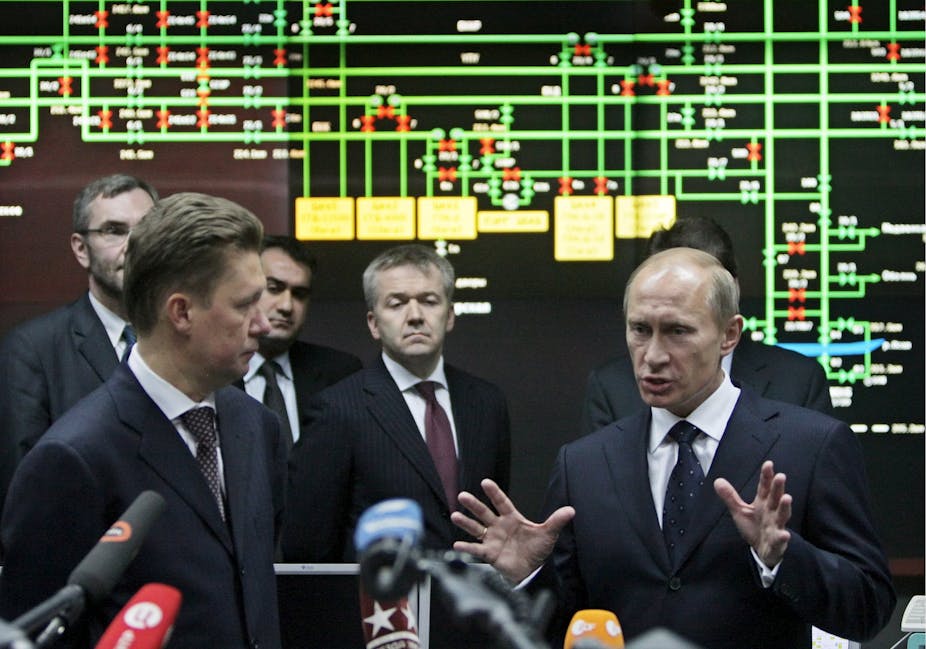Gazprom’s decision to hike the price of the gas it sells to Ukraine came as no surprise as it was flagged more than a month ago. At that time the company’s website showed the Russian prime minister, Dmitry Medvedev, and Gazprom’s chairman, Alexei Miller, sitting across a desk discussing what to do about Ukraine’s outstanding debt for current gas supplies. As if anyone needed convincing, this cosy image makes clear the use of Gazprom as a tool of Russian foreign policy.
But it is this same foreign policy that may yet threaten the future of Gazprom – one of the world’s largest companies. Europe needs Russian gas just as much as Gazprom needs Europe’s cash.
The company has clashed with Ukraine – and by extension the rest of Europe – over supply twice before: in 2006 and 2009. But those were primarily commercial disputes with geopolitical undertones – this time the situation is reversed.
Ironically, 2013 proved a bumper year for Gazprom. Total sales were worth US$162 billion, exports to Europe accounted for 39% of this and exports through Ukraine about 20%. The bottom line is that it does not serve the Kremlin or Gazprom well to disrupt gas supplies to Europe.
Even before the current crisis all was not well for Gazprom in Europe. The European Commission has threatened antitrust charges over the way it prices gas and demand has fallen due to the economic downturn, subsidies for renewable power, the low cost of carbon trading and the availability of cheap coal; all of which means that gas is losing out badly to coal and renewables. The company has granted discounts and relaxed contract terms, but the vast majority of its sales remain oil-indexed and long-term (which also means that many of its European customers are tied in to contracts for years to come).
The EU’s options are clearly limited by its ongoing dependence on Russian gas. Though Russia’s share of EU-27 imports of natural gas declined from 45.1% to 31.8% between 2003 and 2010, there are still calls for further reductions.
In the past the EU’s key worry over Gazprom’s gas was one of “transit security”, especially through Ukraine. Gazprom responded by rerouting supply lines. A major pipeline running under the Baltic Sea to Germany was completed in 2011, and another pipeline running through the Black Sea and the Balkans was due to be completed in 2018 though this project is now on hold.
Today, the EU is more worried about where its gas comes from than how it gets there. Reliance on Russia is the problem; Europe hopes alternative suppliers are the solution.
Gas from Azerbaijan and beyond might help, as would shale gas either imported from the US or developed within the EU. But the reality is that these developments are unlikely to deliver significant amounts of new gas before the end of this decade, if at all.
The proposed “single European gas market” could be an interim solution. A truly competitive market would then force Gazprom and other Russian suppliers to adhere to market principles (this might yet be the outcome of the EC antitrust case). But for the near term at least it will be very difficult for the EU to turn its back on Russian gas supplies.
Even if new suppliers are found in the long term there will still be an opportunity cost for EU members as Russian gas remains the cheapest source of supply. The EU’s ambitious climate change and energy policy could be another solution, as energy efficiency and renewables promotion will both reduce gas demand.
Whichever path is pursued – and the likelihood is an Obama-like “all of the above” approach – Gazprom will lose market share in Europe and its fortunes will then depend on Russia and the rest of Asia.
Putin travels to Beijing next month and hopes to sign a long-term gas agreement with China. After years of negotiations, the two sides have agreed on everything but the price. However, although China needs to burn more gas and less coal to address its air pollution crisis, recent events might make Beijing wary of tying itself into a long-term relationship with Russia. But equally, events in Europe might make the Russian side more willing to concede on price, thus making agreement more likely.
If the two countries fail to strike a deal, Gazprom will be in a tough spot and may yet fall victim to rivals. Rosneft, Russia’s state-owned oil giant wants to develop its own gas business and is seeking access to Gazprom’s planned pipeline in Asia. Late last year Gazprom lost its monopoly over Russia’s gas exports and it now faces stiff competition from Rosneft and others. It is not beyond the realms of possibility that Gazprom will not remain intact much longer.

